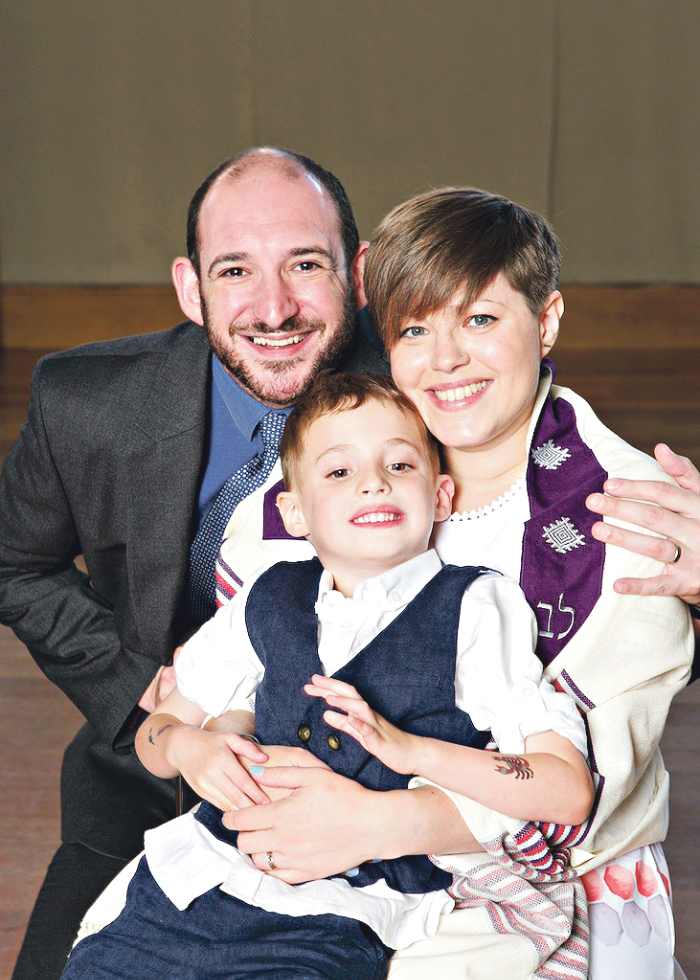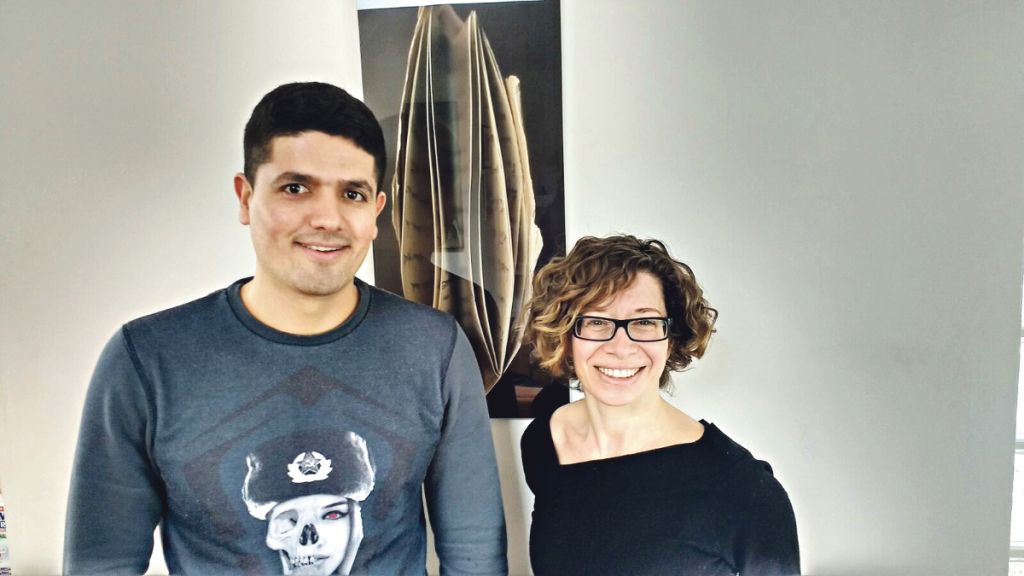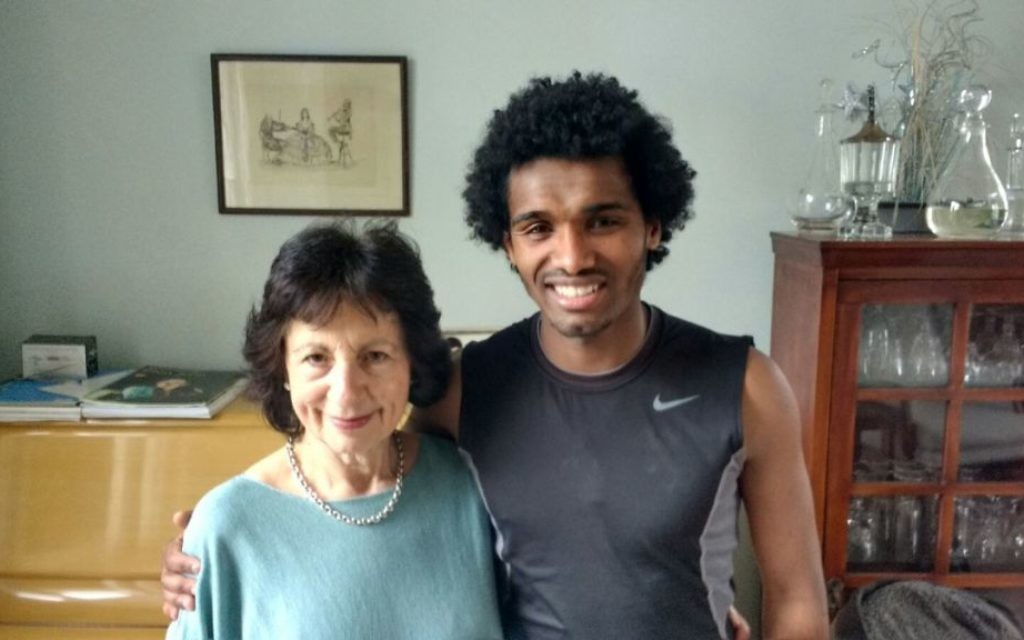Once we were strangers
Stephen Oryszczuk meets Jewish families in London helping refugees and asylum seekers find their feet as they acclimatise to a new country
In the midst of preparing a seder table for 19 people, Sara Nathan tells me Jews, Quakers and LGBTQ+ people are “disproportionately more likely” to open their homes to refugees.
It’s a fascinating insight from someone who should know, because Nathan runs Refugees at Home, a small one-man-band-type charity trying to pair refugees and asylum seekers with people willing to give them a bed, whether for a weekend, a week, a month or even a year.
Doesn’t the government have to provide housing? Yes, she says, but only until someone’s asylum claim is processed. Once it’s been heard, they have 28 days to leave. If unsuccessful they can appeal, but have to find somewhere else to live in the meantime. Even if they’re successful and are granted leave to remain, they still have to find somewhere to live within a month.
Get The Jewish News Daily Edition by email and never miss our top stories Free Sign Up
“When you’ve spent all your money getting here, you don’t speak the language and have no references to get a job to get a deposit to get a room, 28 days isn’t a lot,” says Nathan. “That’s why we need people to step in and offer a bed.”
Enter people like Rabbi Robyn Ashworth-Steen of Jackson’s Row Synagogue in Prestwich, Manchester, one of many British Jews to host a refugee, a young female doctor from Afghanistan in her late 20s who, for good reason, asks not to be named.
She had her request for asylum approved last year and in February Ashworth-Steen saw her profile pop up, asking for urgent accommodation in Manchester so she found she could transfer her medical skills to British certificates.

“We’ve had interesting discussions, about Judaism and Islam, the culture of Afghanistan, how women are treated, and of course about food,” says Ashworth-Steen. “She asked us if we bless our food. We explained and asked her to do a blessing one evening in Arabic. My five-year old son Gabriel was mesmerised. He thought it sounded very similar to Hebrew.”
Ashworth-Steen continues: “Explaining kashrut was interesting, and now having to explain Passover, with two sets of plates and cutlery…! She’s never met anyone Jewish, let alone lived with a rabbi, and her knowledge is very limited, but she’s interested. She asked ‘do you have any books on Judaism?’ I gave her five!”
The female doctor is the first refugee Ashworth-Steen’s family have hosted. She says they decided to give it a go because they had a spare room and wanted to put it to some use, but admits to having had reservations.
“In part it was about privacy,” she says. “It’s difficult enough to have in-laws for a few days. This is having a stranger come and live with you for an indefinite period.” Was there any concern over security? “A bit, but it was fleeting. We soon realised she was far more scared, living with strangers in a strange city, knowing no-one.”
In Finchley, I meet Yemane, a 20-year old Eritrean who is all smiles, a boy’s body and a boy’s mentality. He’s being looked after by Sara Mohr, a psychologist whose own sons are just a little older than him. Yemane speaks only a little English, his first tongue being Amheric, but says he’s a Christian and that religious persecution in 2002, when the government began closing churches, meant he had to flee – aged four – to Sudan with his mother.
Using a map, he shows us his next 16 years, a circuitous route through hell-holes in eastern and northern Africa, including Ethiopia and Libya, via all manner of dangers, finally crossing over on a smuggler’s boat crammed with 400 people, landing 13 hours later in Sicily.
Now, sat in a comfy chair, he tells us about his plans, about how good he is at riding motorbikes (“very excellent”) and how he wants to get a scooter and a licence and work as a delivery man. He’s all enthusiasm but no focus. Sara says she’ll help him, but not financially. He doesn’t know how he’ll get the money.
From an hour’s observation, Mohr seems in many ways motherly towards Yemane, who moved in only a month ago and seems to need more help. Perhaps it’s just that she’s experienced. “Yemane is the second refugee we’ve hosted,” she tells me after Yemane has skipped upstairs to message his friends. “The first was from Sudan, we had him for six months. He was older, very different, very focused. He knew much more where he was going, what he wanted to do. He went to the library every day, using the internet to look for jobs. He knew English , which helped. He had a few false starts, working in places that didn’t pay him, but finally found a job and moved into a room. It’s small, not very nice, but at least it’s his.”
It’s a bit like fostering, I venture. “It is a bit. You have to be around to offer advice. One may say late at night ‘I have to fill in this form, can you help me?’ It’s like if your kid says ‘I’ve got this essay to hand in, can you read it?’”
What do her own sons make of what their mum’s doing? “They think it’s great. It’s all very friendly. The Sudanese guy came to [her eldest boy] Sam’s wedding.”
How did she get involved with Refugees at Home? “We saw an advert in the synagogue for a talk. We said we’d go and sit at the back, but when we arrived we were two of four, so there was no hiding, there was no back! There was a refugee and a host who explained what it was like, and we decided to do it. A social worker came to assess us, then we got an email asking if we’d take someone. They came to dinner with us, he seemed very pleasant with his mentor, so we agreed.”
Do Jewish values come into it? “I don’t think of it like that. I think my husband does. His family fled here from Germany, so he feels strongly that we need to look after refugees, because it was us once and could be us at any time. It could be anyone. We can’t turn a blind eye. My family were a little different in that they came here in the early part of the 20th century and came for a better life. They were refugees in a sense and lucky that they managed it, but not everyone falls on their feet.”
Across her dining table in Crouch End, Miriam Levin talks to her guest Reza, a 28-year old Iranian man who came to the UK following his conversion to Christianity – a big no-no in Iran. “Here, it doesn’t matter,” he says through his translator Catherine. “In Iran, it really does.”
Levin, a diminutive civil servant with short curly hair, is the first Jew he’s met, although there’s a 20,000-strong community in Iran. “The Iranian people have no problem with Jewish people, it’s the governments,” he says. “Everyone knows Iran sees Israel as a bad country.”
Levin says: “It sounds like Iran separates Jews from Israelis in a way maybe we don’t do very well… There’s more conflation here”. Israel sees Iran as a danger – is the view reciprocated? “Yes,” says Reza. “Iran sees Israel as a danger. We know there could be war.”

Over an hour, the shy young man tells us how he came to the UK last year, paying traffickers a small fortune to take him by car over the border, through Turkey, and across to Greece in a dinghy, before flying to the UK on fake papers. What about his family? “They didn’t know I converted, but when I started having issues they learned of it.” What issues? He doesn’t want to say. Was his life threatened? He nods. “Ten days later I got out. I paid all my money. I just wanted to get to a safe country. Greece wasn’t safe – there were fascist gangs, targeting the camps. People were regularly beaten up. So I came to the UK.” Catherine and Levin have been his saviours. “I spent a night in a homeless shelter. They were drunk. It was awful.” Where would he be if not for Levin? He doesn’t know. His is a day-at-a-time existence.
He’s safe now, though, in Levin’s nine-year-old daughter Ariel’s bedroom, the conscientious youngster having given it up for “someone who needs it more than we do”, agreeing to share with her younger sibling. It made Levin and husband Mickey proud, “even though the first response was ‘yes but only if we can have a dog’.”
The family decided to invite a stranger into their home after a year travelling with their two young girls. Was there a safety consideration, because of the kids? “No,” says Levin. “In fact, the kids were part of the reason for doing it.” She says she’d have rather had a woman than a man, but learned from the charity there are far more men than women needing accommodation. She adds: “I trust people until proven otherwise. I trust the organisation and its vetting procedure.”
Why did she do it? Abroad, she says, the family “saw real poverty, real problems… It made us realise just how lucky we were and showed the children that where we live, that’s wonderful, but it’s not normal for most of the world… We were left asking how could we make a difference? ”
It spurred weeks of family discussions. “We spoke to the kids about refugees, about having your own home and having to leave it, about how that’s what happened to Jews during the war,” she says. “Their learning about what Jews went through was very much part of the discussion and the rationale.” So, it’s because they’re Jewish? “No, it’s because it’s the right thing to do.”
I tell Levin that from what Sara Nathan has seen, Jews are one of the three minorities disproportionately more likely to take refugees. “Really? I didn’t know. Aren’t Jews lovely! Maybe it’s because we have a history. We’ve been the other people, at the mercy of other communities. If we can learn from our history, be better, do well by people and be open, generous and kind, then I think we have a duty to do that. For me, is it a Jewish thing? Maybe. Do I think it’s a Jewish value? No, I think it’s a human value.”

Thank you for helping to make Jewish News the leading source of news and opinion for the UK Jewish community. Today we're asking for your invaluable help to continue putting our community first in everything we do.
For as little as £5 a month you can help sustain the vital work we do in celebrating and standing up for Jewish life in Britain.
Jewish News holds our community together and keeps us connected. Like a synagogue, it’s where people turn to feel part of something bigger. It also proudly shows the rest of Britain the vibrancy and rich culture of modern Jewish life.
You can make a quick and easy one-off or monthly contribution of £5, £10, £20 or any other sum you’re comfortable with.
100% of your donation will help us continue celebrating our community, in all its dynamic diversity...
Engaging
Being a community platform means so much more than producing a newspaper and website. One of our proudest roles is media partnering with our invaluable charities to amplify the outstanding work they do to help us all.
Celebrating
There’s no shortage of oys in the world but Jewish News takes every opportunity to celebrate the joys too, through projects like Night of Heroes, 40 Under 40 and other compelling countdowns that make the community kvell with pride.
Pioneering
In the first collaboration between media outlets from different faiths, Jewish News worked with British Muslim TV and Church Times to produce a list of young activists leading the way on interfaith understanding.
Campaigning
Royal Mail issued a stamp honouring Holocaust hero Sir Nicholas Winton after a Jewish News campaign attracted more than 100,000 backers. Jewish Newsalso produces special editions of the paper highlighting pressing issues including mental health and Holocaust remembrance.
Easy access
In an age when news is readily accessible, Jewish News provides high-quality content free online and offline, removing any financial barriers to connecting people.
Voice of our community to wider society
The Jewish News team regularly appears on TV, radio and on the pages of the national press to comment on stories about the Jewish community. Easy access to the paper on the streets of London also means Jewish News provides an invaluable window into the community for the country at large.
We hope you agree all this is worth preserving.
-
By Brigit Grant
-
By Laurent Vaughan - Senior Associate (Bishop & Sewell Solicitors)
-
By Laurent Vaughan - Senior Associate (Bishop & Sewell Solicitors)
-
By Laurent Vaughan - Senior Associate (Bishop & Sewell Solicitors)
-
By Laurent Vaughan - Senior Associate (Bishop & Sewell Solicitors)






















